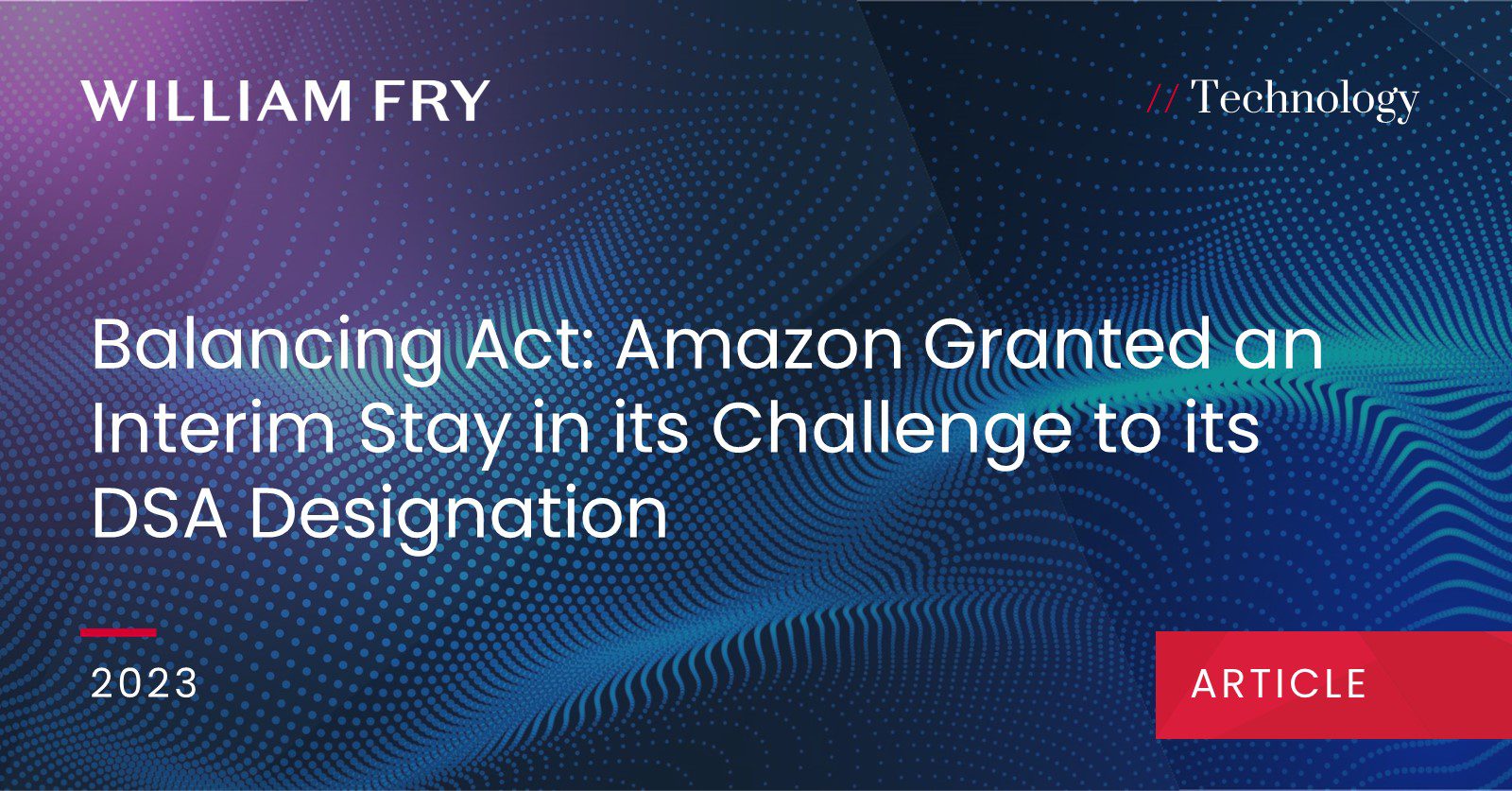On 11 July 2023, Amazon filed a legal challenge against the European Commission’s (Commission) decision to designate its platform as a “Very Large Online Platform” (VLOP) under the Digital Services Act (Regulation 2022/2065) (DSA).
As discussed previously here, Amazon is the second company to challenge its designation as a VLOP, following a similar challenge launched by the German online retailer Zalando in June 2023. Amazon also filed for interim measures to suspend certain requirements under the DSA, pending a decision on the wider legal challenge; Zalando has not yet sought interim measures. This article analyses the order from the General Court issued on 27 September 2023 (Order) on the application for interim relief.
Amazon’s Application for Interim Relief:
Amazon centred its application for interim relief around the obligations imposed by Articles 38 and 39 of the DSA:
- the recommender system opt-out (Article 38); and
- the advertisement repository (Article 39).
It argued that these obligations would result in serious and irreparable harm, focusing on several key points:
1. Article 38 (recommender system opt-out) and Loss of Market Share
Amazon argued that giving customers the ability to opt out of recommender systems, created the risk of irreversible loss of market share, as third-party sellers might switch to other sales channels that are not subject to the same regulatory requirements.
Amazon argued that applying the recommender system requirement would result in the alteration of one of the fundamental pieces of software underpinning its business with immediate and severe negative effects on customers’ shopping experiences. Amazon also argued that it would be at a significant competitive disadvantage in comparison to the online marketplaces and retailers that have not been designated as VLOPs. It argued that many customers who opt out will not be fully aware of the consequences of such a decision, as they would not link a subsequent negative shopping experience to their previous decision to opt out of recommender systems. Instead, customers will assume that a negative shopping experience was due to a general deficiency on Amazon’s part. As a result, those customers might not opt back in for recommender systems at a later stage and will reduce their use of the Amazon store.
Amazon estimated that the negative impact of the recommender system could cost the company between 500 million US dollars (USD) and USD 3.8 billion.
2. Article 39 (Ad Repository) and Disclosure of Confidential Information
Amazon argued that the obligation to compile and disclose the advertisement repository would involve Amazon disclosing confidential advertising strategies, which would weaken its competitive position, making it less attractive to advertisers, and lead to an unquantifiable loss of market share.
The disclosed information would include details about advertisers, targeting parameters, and customer reach. It would also provide competitors with insights into Amazon’s strategies and technologies. Amazon also argued that third-party sellers will move their business to other sales channels, such as their retail stores or other smaller online marketplaces which are not subject to Article 39, even if the requirement to maintain the repository is later removed.
Consequently, Amazon’s view is that it would irreversibly lose market share to its competitors in its general retail activities and its advertising activities through the disclosure of its confidential advertising strategies.
The European Commission responded that Amazon is required to make most of the information in question publicly available under several legal acts of the European Union and that the only change brought about by Article 39 is to group the relevant information in a repository, not to make it publicly available.
3.Pecuniary and Non-Pecuniary Harm
Amazon emphasised that the harm suffered would not only be financial but also non-pecuniary, making it challenging to quantify and prove causality. It argued that any claim for damages post-outcome would be devoid of purpose, as the advertisement repository would have already revealed confidential information publicly.
The Court held that the obligations relating to the advertisement repository under Article 39, which provides information about the advertisements on Amazon’s platform, enable third parties to access significant trade secrets concerning the advertising strategies of Amazon’s advertising customers. It reveals strategic information such as campaign duration, campaign reach, and targeting parameters. By doing so, it will allow competitors and Amazon’s advertising partners to draw market insights on an ongoing basis, to the detriment of Amazon and its advertising partners.
The Court granted Amazon interim measures relating to Article 39 of the DSA, suspending its obligation to provide ad transparency, pending the outcome of its wider challenge to its designation as a VLOP under the DSA. The Court dismissed Amazon’s application for interim measures concerning Article 38 opt-out recommender systems and reserving the costs.
Key takeaways
This decision highlights the importance of analysing your business in depth against any new regulation that may apply to your business. It is only the beginning of a very long road in technology regulation in the coming years with the implementation of many new acts, regulations, and directives all applying to businesses operating in digital services, data, and technology. This decision highlights the tension between regulatory requirements aimed at enhancing digital market transparency and the protection of businesses’ confidential information and competitive edge.
Click here to view the Order.




